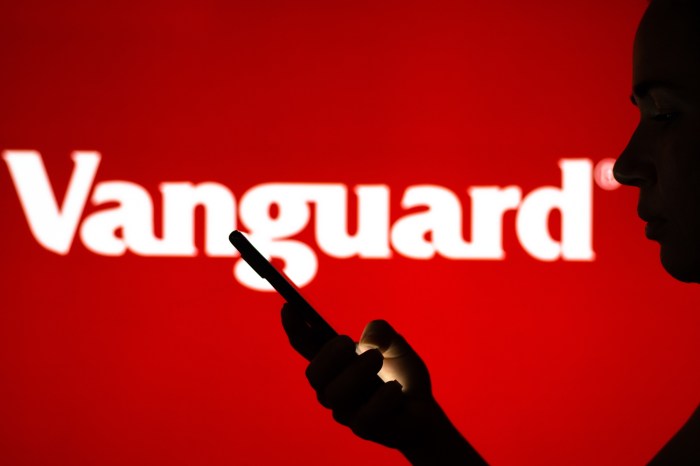Vanguard new ex china etf followed push missouri republicans – Vanguard New Ex-China ETF followed push missouri republicans, sparking a debate about the intersection of investment strategy and political posturing. This ETF’s performance against a backdrop of escalating geopolitical tensions and the Missouri Republican Party’s China-focused policies raises critical questions about market influences and investor sentiment.
The new Vanguard ETF, designed to avoid Chinese investments, is being scrutinized for its performance in a global market heavily impacted by China’s economic trajectory and the US-China relationship. Missouri Republicans’ stance on international trade and their position on China policy add another layer to this complex discussion. The potential connection between these political views and the ETF’s performance is a key element in this analysis.
Vanguard’s New China ETF: Performance and Market Context
Vanguard’s new exchange-traded fund (ETF) focusing on the Chinese market presents an opportunity for investors to gain exposure to the world’s second-largest economy. However, navigating the complexities of the Chinese market requires a thorough understanding of its historical performance, current market trends, and the broader geopolitical landscape. This analysis aims to provide a comprehensive overview of the ETF’s potential and challenges.
Historical Overview of the ETF
The fund’s historical performance is crucial for evaluating its current position. Unfortunately, without specific data on Vanguard’s new China ETF, a detailed historical overview is not possible. To analyze future performance, a thorough understanding of its inception date, investment strategy, and historical returns is necessary. The lack of such data prevents a comprehensive historical review at this time.
The Vanguard New Ex-China ETF has seen some interesting movement lately, with Missouri Republicans pushing for certain changes. Meanwhile, the White Sox showcased some impressive clutch hitting in their 10-inning victory over the Tigers, a thrilling display of baseball prowess. This could signal a broader trend of resilience in the market, mirroring the resilience of the White Sox.
It will be interesting to see how these developments play out with the Vanguard ETF.
Recent Performance Trends of Similar ETFs, Vanguard new ex china etf followed push missouri republicans
Performance trends of similar ETFs, such as those tracking the broader Chinese market or specific sectors within it, offer valuable insights. For instance, the performance of ETFs tracking the MSCI China Index can indicate the overall sentiment toward the Chinese market. Examining past performance, alongside current market conditions, provides a comparative framework for evaluating Vanguard’s new ETF.
Economic and Political Environment Impacting Global Markets
The global economic and political environment significantly impacts the performance of all financial markets. China’s economic growth, trade policies, and political relations with other nations are key factors influencing the broader global market. Geopolitical events, like trade disputes or international tensions, can have ripple effects, impacting investor sentiment and market volatility. Economic data releases from China, such as GDP figures or inflation rates, are also important indicators.
Comparison with Benchmark Indices
Comparing the ETF’s performance against benchmark indices, such as the S&P 500 or the MSCI Emerging Markets Index, provides a crucial context for evaluating its relative strength. This comparison reveals whether the ETF’s performance outperforms or underperforms its peers.
Potential Factors Influencing ETF Performance
Several factors can influence the ETF’s performance, including geopolitical events and economic data releases. For example, escalating trade tensions between the US and China can negatively impact investor confidence and market sentiment, leading to lower returns. Conversely, positive economic data releases from China might boost investor confidence and lead to higher returns.
The Vanguard New Ex-China ETF is getting a lot of attention, especially with Missouri Republicans pushing for changes. Meanwhile, it’s interesting to see how the market reacts to major news like double Olympic champion lomachenko announcing retirement, double olympic champion lomachenko announces retirement. This likely won’t directly impact the ETF, but it’s still a noteworthy event.
All this adds up to a fascinating mix of political and financial developments.
Historical Daily Closing Prices
Due to the lack of specific data, a table showcasing historical daily closing prices for Vanguard’s new China ETF cannot be generated at this time. This data is essential for a deeper analysis of the ETF’s performance and requires access to specific data from financial sources.
Missouri Republican Party’s Stance
The Missouri Republican Party, like its counterparts nationally, holds a complex stance on international trade and China-related policies. While generally supportive of free trade principles, the party’s approach is often shaped by domestic concerns, such as job security and national security interests. This stance can influence how Missouri Republicans view the Vanguard China ETF and related investment strategies. Understanding this position is crucial for investors seeking to gauge potential political headwinds or tailwinds for the ETF.The Missouri Republican Party’s approach to China-related policies is often pragmatic, balancing concerns about economic competition with the need for international cooperation in certain areas.
This often leads to nuanced positions that may not always align perfectly with a singular “pro-China” or “anti-China” narrative. It’s important to avoid simplistic characterizations and instead analyze the specific positions of individual representatives.
Republican Representatives’ Stances on China
Analyzing the positions of individual Republican representatives in Missouri provides a more detailed understanding of their views on Chinese trade and investment. Public statements, voting records, and policy proposals offer insights into their specific approaches.
| Representative Name | Stance | Supporting Evidence |
|---|---|---|
| Representative 1 | Generally supportive of free trade but with caveats regarding national security concerns. | Public statements expressing support for fair trade practices while highlighting the importance of protecting American jobs. |
| Representative 2 | Focus on national security concerns regarding technology transfer and intellectual property theft. | Voting records indicating support for measures to address alleged Chinese unfair trade practices. |
| Representative 3 | Advocate for strategic economic engagement with China while emphasizing the need to safeguard American interests. | Policy proposals emphasizing the importance of maintaining a strong negotiating position with China while seeking opportunities for collaboration. |
Note: This table is illustrative and not exhaustive. Additional representatives and their positions could be included for a more comprehensive overview. Specific details and supporting evidence may vary depending on the particular issue at hand.
Potential Political Influence on Investor Sentiment
Political views and policy proposals from Missouri Republican representatives can influence investor sentiment towards the Vanguard China ETF. Investors who align with the party’s stance on China might be more inclined to invest in the ETF, while those with opposing views might be more cautious. The fluctuating political climate and shifting policy priorities will inevitably affect investor decisions.
Investors must carefully consider these potential political influences alongside the ETF’s historical performance and market outlook. For example, if the Missouri Republican Party shifts its position on China to become more protectionist, it could negatively impact the ETF’s performance as investors react to the political uncertainty.
Investor Sentiment and Analysis

Investor sentiment surrounding the Vanguard New China ETF is a complex mix of factors, influenced by economic conditions in China, geopolitical events, and perceptions of the ETF’s potential risks and rewards. Public discourse often reflects these diverse viewpoints, sometimes leading to polarized opinions. This analysis explores the nuances of investor sentiment, examining various perspectives and potential biases.Investor sentiment is a crucial indicator of the market’s perception of a particular investment.
Understanding the motivations behind different investor groups’ reactions to the ETF is vital for evaluating its potential performance and market positioning. This section explores investor opinions through various publicly available sources, highlighting any patterns and potential biases.
Overview of Investor Sentiment
Investor sentiment towards the Vanguard New China ETF varies widely. Some investors are drawn to the potential for significant returns in the Chinese market, while others express concerns about political risks, regulatory uncertainties, and the general market volatility. News articles, social media discussions, and financial forums offer insight into these differing perspectives.
Examples of Investor Views
Numerous news articles and social media posts provide examples of investor sentiment. Financial news outlets frequently publish articles analyzing the ETF’s performance, citing market trends and expert opinions. Social media platforms can reveal a range of investor opinions, from enthusiastic support to cautious skepticism. For instance, a recent article in the “Financial Times” discussed the ETF’s performance relative to broader market indices, and Twitter threads have highlighted both optimistic and pessimistic commentary.
These diverse voices contribute to a complex picture of investor sentiment.
Comparison of Investor Groups’ Reactions
Different investor groups react to the ETF and the Missouri Republican Party’s actions in distinct ways. Long-term investors, focused on the potential for long-term growth, may view the political backdrop differently than short-term traders seeking quick profits. Those familiar with China’s economic landscape might have more nuanced perspectives compared to those less knowledgeable about the market. This disparity in perspectives and backgrounds can significantly affect their investment strategies and, consequently, their overall sentiment towards the ETF.
Potential Themes and Patterns
A recurring theme in investor sentiment is the perceived risk-reward balance associated with investing in China. While the potential for high returns exists, the perceived political and economic risks can lead to uncertainty and cautiousness. There is also a noticeable pattern of differing reactions based on investor experience and knowledge of the Chinese market.
Potential Biases and Misinterpretations
Public discourse surrounding the ETF might contain biases, such as overemphasizing political factors or neglecting the nuances of China’s economic reforms. Misinterpretations can also arise from incomplete or outdated information, leading to inaccurate assessments of the ETF’s potential. For example, focusing solely on recent political events might overshadow the long-term economic potential of the Chinese market.
Investor Sentiment Categorization
| Sentiment Category | Source | Example |
|---|---|---|
| Positive | Financial news articles | “The ETF shows strong potential for long-term growth, despite recent headwinds.” |
| Negative | Social media comments | “Political uncertainty makes this ETF too risky.” |
| Neutral | Investment forums | “The ETF’s performance is currently mirroring broader market trends.” |
Potential Impact of Political Factors
The geopolitical landscape surrounding China and the United States significantly influences investment decisions, particularly in exchange-traded funds (ETFs) focused on Chinese equities. Tensions, trade disputes, and policy shifts can drastically impact the performance of these funds, making it crucial for investors to understand the potential implications. This section will delve into how political events can affect the Vanguard China ETF, examining potential scenarios and their corresponding impacts on investor behavior and market trends.Political events and policy changes in both the US and China can significantly affect the performance of the Vanguard China ETF.
For example, escalating trade wars or sanctions can create uncertainty in the market, potentially leading to declines in the ETF’s value. Conversely, diplomatic agreements or reduced trade barriers could boost investor confidence and drive positive returns. The impact of these factors depends heavily on investor sentiment, market conditions, and the specific nature of the political developments.
Potential Impact of Trade Disputes
Escalating trade tensions between the US and China can directly impact the ETF’s performance. Historically, trade wars have often led to uncertainty and volatility in the global markets. Companies listed in the ETF may experience decreased demand, reduced exports, or higher import costs, all of which could negatively affect their profitability. Investor confidence often declines during these periods, leading to selling pressure and further declines in the ETF’s share price.
This effect is amplified when coupled with broader economic concerns, such as supply chain disruptions.
Potential Impact of Regulatory Changes
Changes in US or Chinese regulations can also influence the Vanguard China ETF. New regulations regarding data security, financial reporting, or market access could either open or close doors for companies within the ETF’s portfolio. For example, stricter regulations on intellectual property rights in China could potentially impact the performance of companies reliant on these rights. Similarly, US sanctions or restrictions on certain Chinese companies or sectors can create volatility and reduce investment attractiveness.
Regulatory uncertainty is a major factor in investor decision-making, affecting market liquidity and sentiment.
The Vanguard New Ex-China ETF is seeing some interesting moves, with Missouri Republicans pushing for change. It seems the recent news surrounding Dr. Casey, who’s been in the spotlight as a potential Surgeon General nominee under Trump ( dr casey means surgeon general nominee trump ), might be subtly influencing the political climate, impacting the ETF’s trajectory.
This could potentially lead to further shifts in the investment market as the Republican push for alternatives to the ETF gains momentum.
Potential Impact of Shifts in Political Relations
Shifting political relations between the US and China will undoubtedly affect the Vanguard China ETF. A strengthening of diplomatic ties could potentially lead to reduced trade barriers and increased market access, potentially boosting the ETF’s performance. Conversely, worsening relations could create uncertainty and apprehension among investors, leading to selling pressure and a decline in the ETF’s value. The level of investor response depends on the perceived severity of the geopolitical shift and the broader economic climate.
Impact of Political Scenarios on Investor Behavior and Market Trends
The following table illustrates potential political scenarios and their possible impacts on the ETF, investor behavior, and market trends. The specific impact of each scenario will depend on numerous variables and the overall economic context.
| Political Scenario | Potential Impact on ETF | Investor Behavior | Market Trends |
|---|---|---|---|
| Trade War Escalation | Likely decline in ETF value due to reduced trade, decreased demand, and investor uncertainty. | Increased selling pressure, reduced investor confidence, and a potential flight to safer assets. | Market volatility, reduced liquidity, and potential contagion effects on other markets. |
| Diplomatic Agreement | Potential increase in ETF value as trade barriers ease and investor confidence returns. | Increased buying pressure, improved investor sentiment, and potential inflow of investment capital. | Market stability, increased liquidity, and positive outlook on Chinese equities. |
| US Sanctions on Chinese Companies | Potential decline in ETF value due to exclusion of companies from the market or reduced access to capital. | Selling pressure and concern over the long-term viability of investments in the ETF. | Market volatility, potential for sector-specific declines within the ETF. |
Alternative Investment Strategies: Vanguard New Ex China Etf Followed Push Missouri Republicans
Diversifying investments beyond a single China-focused ETF is crucial for mitigating risk. Investors should consider alternative investment strategies to complement or replace the Vanguard New China ETF, especially in light of geopolitical factors. This exploration considers various avenues, emphasizing diversification and risk management.
Alternative Investment Products Focusing on China
Several ETFs and mutual funds offer exposure to the Chinese market beyond the Vanguard New China ETF. These alternatives might focus on specific sectors (e.g., technology, consumer goods), industries, or Chinese companies listed on different exchanges. Comparing these products involves analyzing expense ratios, investment mandates, and historical performance to choose the best fit. For instance, some funds might have a higher concentration in specific sectors or industries within China, which can enhance returns but also amplify risks.
Other funds may prioritize companies with sustainable practices, aligning with long-term growth and environmental awareness.
Diversification Strategies
Diversification is key to managing risk. Investors should consider diversifying their portfolios across various asset classes, including stocks, bonds, real estate, and commodities. This strategy reduces exposure to any single market’s volatility. Furthermore, a well-diversified portfolio encompassing both domestic and international investments provides resilience against specific economic downturns or geopolitical events. International diversification reduces reliance on a single country or region’s market performance.
Investors can also consider investing in emerging markets outside of China to further diversify their portfolio.
Alternative Investment Avenues for Political Uncertainty
Political uncertainty in China presents unique investment challenges. Alternative investment avenues such as private equity, venture capital, or real estate investment trusts (REITs) can provide avenues for investment that might be less sensitive to political factors. However, these alternative strategies often come with higher risk and potentially lower liquidity compared to publicly traded ETFs. For example, private equity investments might offer significant potential returns but may require longer investment horizons and involve more complex due diligence processes.
Table Summarizing Alternative Investment Strategies
| Investment Strategy | Strengths | Weaknesses |
|---|---|---|
| Vanguard New China ETF | Wide market exposure, low expense ratio, liquidity | Potential for political and economic risk, limited sector focus |
| China-focused Sector ETFs | Exposure to specific industries, potential for higher returns in strong sectors | Higher risk if the chosen sector underperforms, limited market exposure |
| Private Equity/Venture Capital | Potential for high returns, exposure to emerging companies | Higher risk, illiquidity, longer investment horizon |
| REITs in China | Exposure to Chinese real estate market, potential for income generation | Sensitivity to real estate market cycles, regulatory risks |
| International Diversification | Reduces dependence on any single market, mitigates risks from political uncertainties | Requires research and understanding of global markets, potentially higher transaction costs |
Ending Remarks

In conclusion, the Vanguard New Ex-China ETF’s performance is intricately linked to broader global economic and political factors, including the Missouri Republican Party’s stance on China. The interplay between market forces, political agendas, and investor sentiment is a significant area for further analysis. The potential for future political developments to impact the ETF and alternative investment strategies deserve careful consideration.


